Kent Walker promotes public policies which advantage the Google monopoly.
His role doing that means he has to write some really bad hot takes that lack context or intentionally & dishonestly redirect attention away from core issues - that's his job.
With that in mind, his most recent blog post defending the Google monopoly was exceptional.
Force Ranking of Inferior Search Results
"When you have an urgent question — like “stroke symptoms” — Google Search could be barred from giving you immediate and clear information, and instead be required to direct you to a mix of low quality results."
On some search queries users get a wall of Google ads, the forced ranked Google insert (or sometimes multiple of them with local & ecommerce) and then there can even be a "people also ask" box above the first organic result.
The idea that organic results must be low quality if not owned & operated indicates 1 of the following 3 must be true:
- they should not be in search
- their content scraping & various revenue shifting scams with their ad tech stack demonetized legit publishers
- their forced rank of their own content is stripping them of the signals needed to rank websites & pages
Whenever Google puts a "people also ask" box above the first organic result that is them saying they did not know what to rank, or they are just trying to create a visual block to push the organic result set down the page and user attention back up toward the ads.
The solution to Google's claims is easy to solve. Either of the following would work.
- Have an API that allows user choice (to set rich snippet or vertical defaults in various categories), or
- If the vertical inserts remain Google-only then for Google to justify force ranking their own results above the organic result set Google should also be required to rank those same results above all of their ads, so that Google is demonetizing Google along with the rest of the ecosystem, rather than just demonetizing third parties.
If the thesis that this information needs to be front and center & that is a matter of life or death, then asking searchers to first scroll past a page or two of ads is not particularly legitimate.
Spam & Security
"when you use Google Search or Google Play, we might have to give equal prominence to a raft of spammy and low-quality services."
Many of the worst versions of spam that have repeatedly made news headlines like fake tech support, fake government document providers, and fake locksmiths were buying distribution through Google Ads or were featured in the search results through Google force ranking their own local search offering even though they knew the results were vastly inferior to Yelp.
If Google did not force rank Google local results above the rest of the organic result set then the fake locksmiths would not have ranked.
I have lost count of how many articles I have read about hundreds or thousands of fake apps in the Google Play store which existed to defraud advertisers or commit identity theft, but there have been literally thousands of such articles. I see a similar headline at least once a month without eve looking for them. Here is one this week for scammers monetizing the popularity of Wordle with fake apps.
Making matters worse, some of the tech support scams showed the URL of a real business and rerouted the call through a Google number directly to a scammer. A searcher who trusted Google & sees Apple.com or Dell.com on Google Ads in the search results then got connected with a scammer who would commit identity theft or encrypt their computer then demand ransom cryptocurrency payments to decrypt it.
After making the ads harder to run for scammers Google decided the problem was too hard & expensive to sort out so they also blocked legitimate computer repair shops.
Sometimes Google considers something spam strictly due to financial considerations.
Their old remote rater documents stated *HELPFUL* hotel affiliate websites should be labeled as spam.

Years later the big OTAs are complaining about Google eating their lunch as well as Google is twice as big as the next player.
At one point Google got busted for helping an advertiser route around the automated safety features built into their ad network so that they could pay Google to run ads promoting illegal steroids.
With cartels, you can only buy illegal goods and services from the cartel if you don't want to suffer ill consequences. The same appears to be true here.
The China Problem
"Handicapping America’s technology leaders would threaten our leading sources of research and development spending — just as bipartisan voices in Congress are recognizing the need to increase American R&D investment to stay competitive in the global race for AI, quantum, and other advanced technologies."
We are patriotic, and, but China... is a favorite misdirection of a tech monopolist.
The problem with that is while Eric Schmidt warns it is a national emergency if China overtakes the US in AI tech, Google also operates an AI tech lab in China.
In other words, Eric Schmidt is trying to warn you about himself and his business interests at Google.
Duplicitous? Absolutely.
Patriotic? Less than Chamath!
Inflation
"the online services targeted by these bills have reduced prices; these bills say nothing about sectors where prices have actually been rising and contributing to inflation."
Technology is no doubt deflationary (moving bits on an optical line is cheaper than printing out a book and shipping it across the world) BUT some dominant channels have increased the cost of distribution by increasing the chunk size of information and withholding performance information.
Before Google Analytics was "free" there was a rich and vibrant set of competition in web analytics software with lots of innovation from players like ClickTracks.
Most competing solutions went away.
Google moved away from an installed licensing model to a hosted service where they can change the price upon contract renewal.
Search hid progressively more performance information over time, only sampled data from larger data sets, & now you can sign up for Google Analytics 360 starting at only $150,000 per year.
The hidden search performance data also has many layers to that onion. Not only does Google not show keyword referrers on organic search, but they often don't show your paid search keywords either, and they keep extending out keyword targeting broader than advertisers intend.
Google used to pay Brad Geddes to run official Google AdWords ad training seminars for advertisers, so the idea that *he* has to express his frustrations on Twitter is an indication of how little effort Google is putting into having open communications channels or caring about what their advertisers think.
This is in accordance with the Google customer service philosophy:
he told her that the whole idea of customer support was ridiculous. Rather than assuming the unscalable task of answering users one by one, Page said, Google should enable users to answer one another's questions.
Those who were paying for ads get the above "serve yourself" treatment, all the while Google regularly resets user default ad settings to extend out ad distribution, automatically ad keywords, shift to enhanced AdWords ad campaigns, etc.
Then there are other features which would be beneficial and offered in a competitive market that have been deprioritized. Many years ago eBay did a study which showed their branded Google AdWords ad buys were cannibalistic to eBay profits. Google maintained most advertisers could not conduct such a study because it would be too expensive and Google does not make the feature set available as part of their ad suite.
Missing Information
"When you search for local businesses, Google Search and Maps may be prohibited from highlighting information we gather about hours of operation, contact information, and reviews. That could hurt small businesses and local retailers, as well as their customers."
Claiming reviews or an attempt to offer a comprehensive set of accurate review data as a strong point would be economical with the truth.
Back when I had a local business page my only review was from a locksmith spammer / scammer who praised his own two businesses, trashed a dozen other local locksmiths, crapped on a couple local SEO services, and joked about how a local mover smashed the guts out of his dog. Scammer fake reviewer's name was rather sophisticated ... it was ... Loop Dee Loop

About a decade back when Google was clearly losing Google took Yelp reviews wholesale (sometimes without even attributing them to Yelp!) and told Yelp that if they did not want Google stealing their work and displacing them with a copy of it then they should block GoogleBot. Google offered the same sort of advice / threat to TripAdvisor.
A few years before that Google temporarily "forgot" to show phone numbers on local listings.
After Yelp turned down an acquisition offer by Google & Yelp did a great job making some people aware of how Google was stealing their reviews wholesale without attribution Google bought Zagat & Fromer's to augment the Google local review data and then sold those businesses off.
This is sort of the same playbook Google has run in the past elsewhere. After Groupon said no to Google's acquisition offer, Google quickly provided daily deal ads to over a dozen Groupon competitors to help commoditize the Groupon offering and market position.
Ultimately with the above sort of stuff Google is primarily a volume aggregator or has lower editorial costs than pure plays due to the ability to force bundle their own distribution. And they use the ability to rank themselves above a neutral algorithmic position as a core part of their biz dev strategy. When shopping search engines were popular Google kept rewording the question set they sent remote raters to justify rank demotion for shopping search engines & Google also came up with innovative ranking "signals" like concurrent ranking of their own vertical search offering whenever competitors x or y are shown in the result set & rolled out a "diversity" algorithm to limit how many comparison shopping sites could appear in the search results. The intent of the change was strictly anti-competitive:
"Although Google originally sought to demote all comparison shopping websites, after Google raters provided negative feedback to such a widespread demotion, Google implemented the current iteration of its so-called 'diversity' algorithm."
As a matter of fact, part of one of many document dumps in recent years went further than the old concurrent ranking signal to a rank x above y feature which highlights how YouTube can be hard coded at a number 1 ranking position.
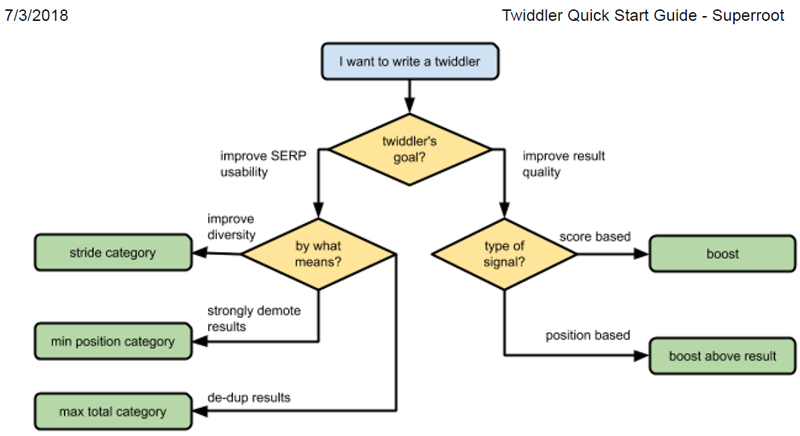
Part of that guide highlighted how to hardcode ranking YouTube #1.
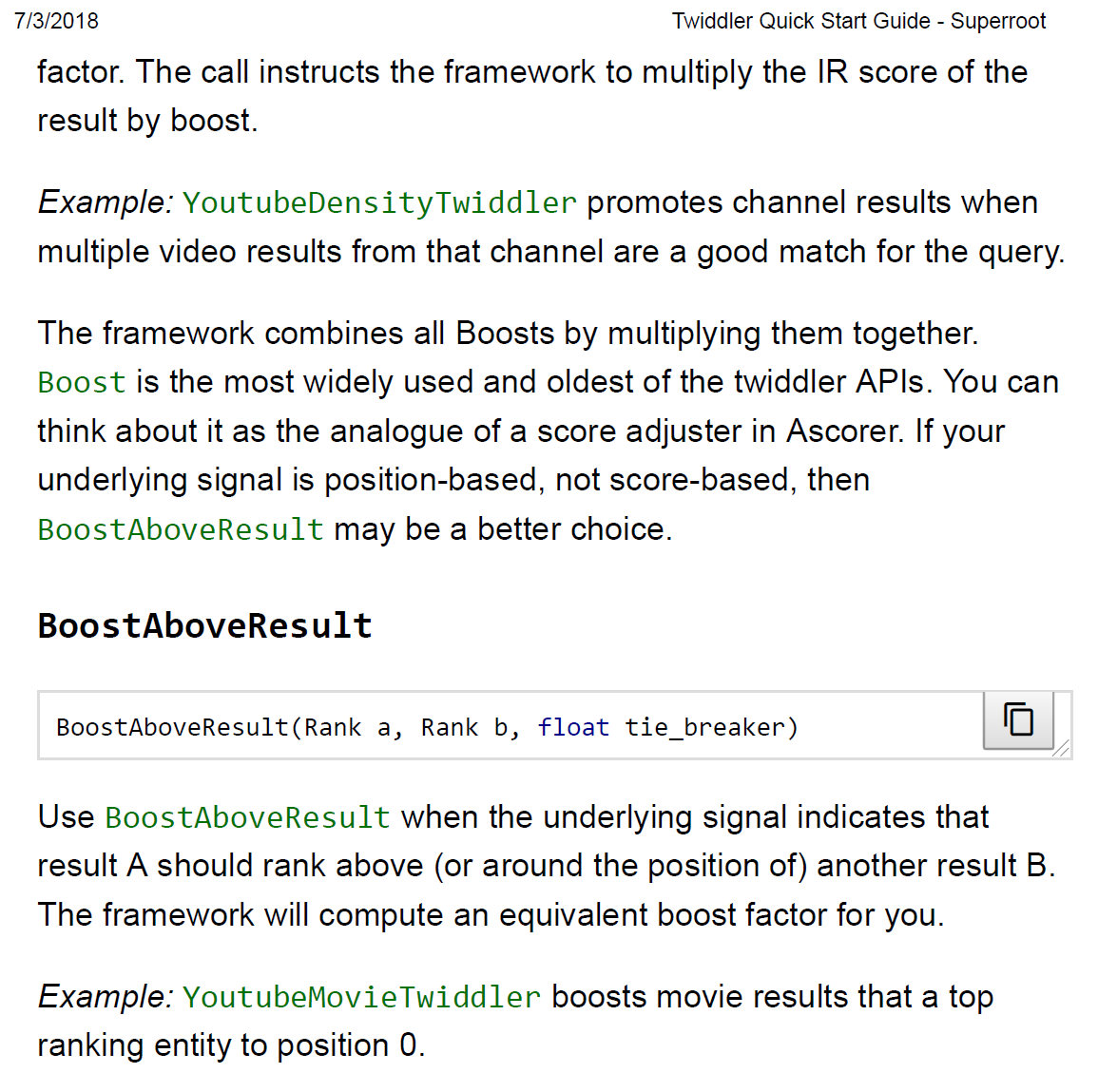
If you re-represent content & can force rank yourself #1 (with larger listings) that can be used to force other players onto your platform on your terms. Back when YouTube was must less of a sure thing Google suggested they could threaten to change copyright.
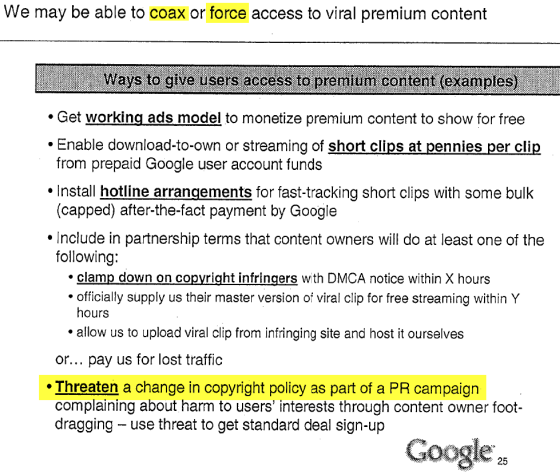
This same approach to "relevancy" is everywhere.
Did you watermark your images? Well shame on you, as that is good for a rank demotion
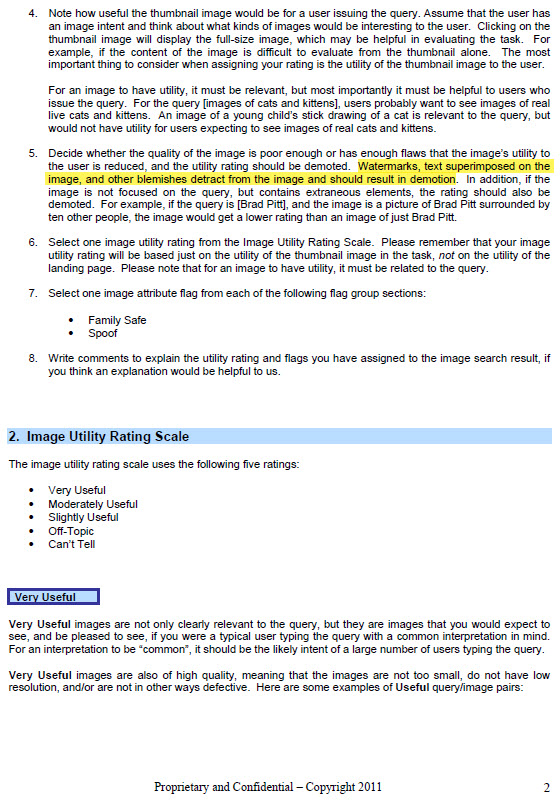
And if there are photos which are deemed illegal Google will make you file an endless series of DMCA removal requests even though they already had the image fingerprinted.
Now there are some issues where there is missing information. These areas involve original reporting on local politics & are called news deserts. As the ad pie has consolidated around Google & Facebook that has left many newspapers high and dry.
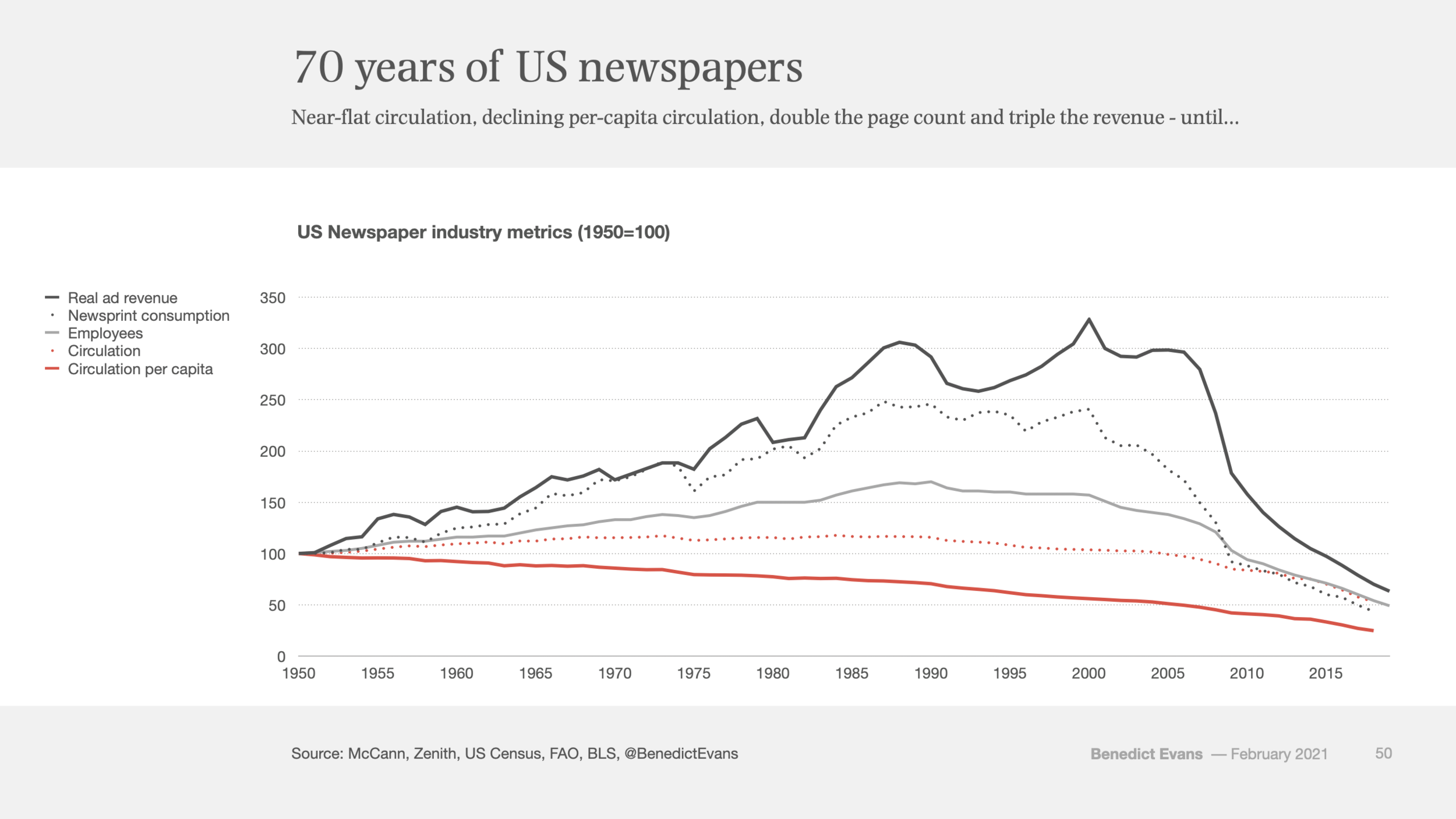
Private equity players like Alden Global Capital buy up newspapers, fire journalists, and monetize brand equity as they drive the papers into the ground.
If you are sub-scale maybe Google steals your money or hits you with a false positive algorithm flag that has you seeking professional mental health help.
Big players get a slower blood letting.
Google has maintained they do not make any money from news search, but the states lawsuit around ad tech made it clear Google promoted AMP for anti-competitive purposes to block header bidding, lied to news publishers to get them to adopt AMP and eat the tech costs of implementation, did a deal with their biggest competitor in online advertising Facebook to maintain the status quo, charge over double what their competitors do for ad tech, and had a variety of bid rigging auction manipulation algorithms they used to keep funneling more money to themselves.
Internally they had an OKR to make *most* search clicks land on AMP pages within a year of launch
"AMP launched as an open source project in October 2015, with 26 publishers and over 40 publications already publishing AMP files for our preview demo. Our team built g.co/ampdemo and is now racing towards launching it for all of our users. We're responsible for the AMP @ Google integrations, particularly focusing on Search, our most visible product. We have a Google-wide 2016 OKR to deliver! By the end of 2016, our goal is that 50%+ of content consumed through Search is being consumed through AMP."
You don't get over half the web to shift to a proprietary version of HTML in under a year without a lot of manipulation.


